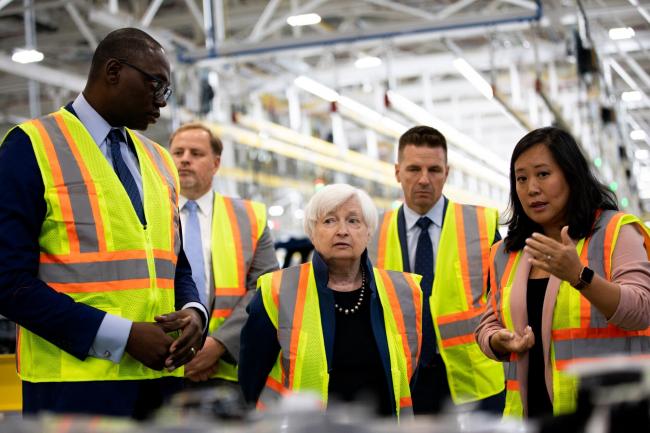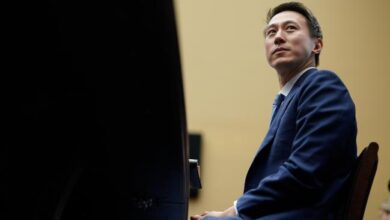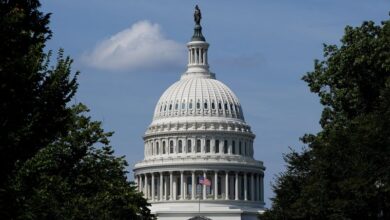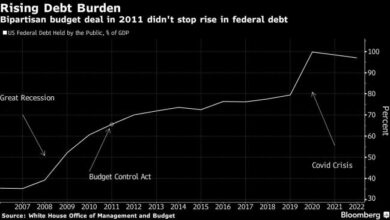Biden Reaches Moment of Truth for Electric Vehicle Tax Credits

© Bloomberg. Treasury Secretary Janet Yellen touring the Ford F-150 Lightning production line in September. Photographer: Emily Elconin/Bloomberg
RWT
+0.54%
Add to/Remove from Watchlist
Add to Watchlist
Add Position
Position added successfully to:
Please name your holdings portfolio
Type:
BUY
SELL
Date:
Amount:
Price
Point Value:
Leverage:
1:1
1:10
1:25
1:50
1:100
1:200
1:400
1:500
1:1000
Commission:
Create New Watchlist
Create
Create a new holdings portfolio
Add
Create
+ Add another position
Close
VOWG_p
+0.29%
Add to/Remove from Watchlist
Add to Watchlist
Add Position
Position added successfully to:
Please name your holdings portfolio
Type:
BUY
SELL
Date:
Amount:
Price
Point Value:
Leverage:
1:1
1:10
1:25
1:50
1:100
1:200
1:400
1:500
1:1000
Commission:
Create New Watchlist
Create
Create a new holdings portfolio
Add
Create
+ Add another position
Close
(Bloomberg) — One week from today, the auto world will know where the Biden administration stands on some of the toughest policy questions surrounding the US transition to electric vehicles.
Ever since Senator Joe Manchin shocked Washington by clinching a left-for-dead climate deal, lobbyists have tried to tweak rules around just how much content carmakers and their suppliers will have to source domestically. The Democrat from West Virginia has repeatedly criticized these efforts, which he says will sacrifice US energy independence and national security in the name of fighting climate change.
Most automakers — which want to lower costs and maximize government support to sell as many EVs as possible — have been discreet about trying to drill holes in Manchin’s rules, doing most of their persuasion in private, with some exceptions.
The Treasury Department’s unenviable task has been to try to balance these competing interests while going through its process of interpreting the law and implementing it through the US tax code. By March 31, Treasury will issue guidance on a key portion of the Inflation Reduction Act, called Section 30D. That’s the part that determines whether US consumers get as much as $7,500 off when they buy a fully electric or plug-in hybrid vehicle.
Specifically, the law says vehicles can qualify for the full $7,500 credit if at least half of their battery components are made in North America, and if 40% of the value of raw materials in the battery are extracted from or processed domestically or in countries the US has free-trade agreements with.
The fine print of these rules was supposed to be finalized by the end of last year, but the task is so complex — and the lobbying so intense — that Secretary Janet Yellen punted to the end of March. In late December, Treasury published a white paper with some clues as to how it was leaning.
Based on conversations with battery executives, lobbyists, and policy wonks, here are a few key items the industry will be looking out for next week:
Foreign Entities of Concern
The idea is simple: The US doesn’t want its auto industry to be dependent on geopolitical adversaries, led by China. But determining whether one of these foes — a foreign entity of concern, in IRA terms — has control or influence over a company that mines or processes critical minerals? That’s complex. Setting hard rules for the world’s companies to follow is extremely complicated.
What if, for example, a Chinese company processes lithium in China, then ships it to a joint venture partner in a US-friendly country like Mexico or Hungary, for export to the US? Do those minerals count toward the tax credit?
There are already examples like this from the solar industry: The Commerce Department recently clamped down on eight Chinese companies that were producing solar cells and modules in China, then shipping them to countries like Malaysia or Vietnam for minor tweaks before export to the US.
Critical Minerals vs. Components
In a show of lenience toward the auto industry, Treasury’s white paper added some new language that wasn’t in the original law: “constituent materials.” As Bloomberg reported earlier this week, companies including Redwood (NYSE:RWT) Materials, which produces cathode using recycled batteries, are sounding the alarm on this change.
Treasury’s maneuver meant that cathode — the most expensive part of a battery — would be part of the easier-compliance critical minerals bucket, rather than the more restrictive battery component bucket. This would mean cathode could come from any country with a free-trade agreement with the US, instead of just North America, and still qualify.
That’s bad news if you’re a startup cathode maker in the US — it would mean having to compete on price with Korean and Japanese incumbents.
“We’d basically be right back where we were before the IRA even happened,” said J.B. Straubel, the founder and CEO of Redwood, which has lined up deals with automakers including Ford, Toyota and Volkswagen (ETR:VOWG_p). “This creates a huge amount of uncertainty and churn amongst all of our partners and customers.”
Free-Trade Agreements
Section 30D says 40% of critical minerals in an eligible EV battery — a minimum that gradually will rise to 80% in 2027 — must be extracted from or processed in countries that have a free-trade agreement with the US. Officially, that list includes key commodity producers including Canada, Australia, Chile and South Korea.
The European Union and Japan are miffed about being left out in the cold, and the Biden administration has been working on mini critical mineral trade deals to grandfather them in. Down the road, countries like Argentina could join, too.
As China and Russia grow closer, it’s important for the US to forge its own supply lines with allies. But some groups, including unions representing steelworkers and autoworkers, aren’t happy about some of those new mining and processing jobs being overseas. And Congress is getting increasingly ornery about being cut out of the negotiations.
So far, Treasury’s track record has been kind to the auto industry. In December, officials blessed a gaping loophole that lets car companies circumvent Manchin’s content rules by counting leased cars as commercial vehicles. In February, they capitulated to carmakers’ demands to use EPA definitions for what constitutes a sport utility vehicle so that more models would qualify for credits.
Regardless of how the rules shake out, automakers ought to take a longer view, said Robbie Diamond, the founder of Securing America’s Energy Future, a Washington think tank that advocates for US energy independence.
“The American political system isn’t becoming more flexible when it comes to building our industrial base and decreasing dependence on China,” Diamond said. “This is a moving target, and the target is getting more stringent.”





